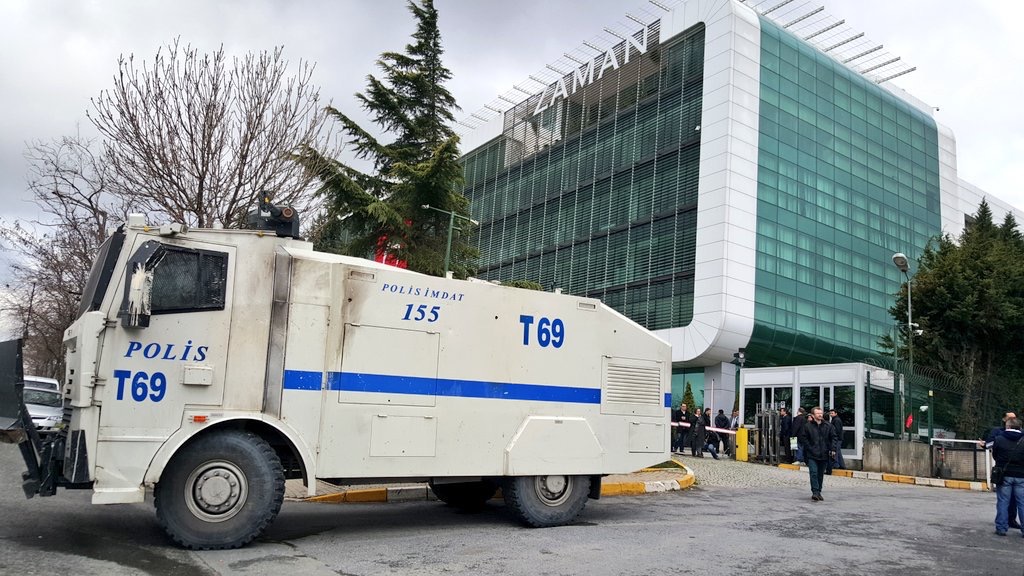
With much of Europe focused on a deal with Turkey to stem the flow of Syrian refugees into the European Union, the critical Middle Eastern country took another large step toward illiberalism over the weekend.![]()
Following a court order, riot police on Friday took control of the country’s Zaman newspaper, with by far the highest circulation in Turkey. Police forcibly entered the news offices on Friday, firing its editor, Abdülhamit Bilici, and using tear gas to dispel any lingering protests from reporters and readers who might oppose one of the most shamelessly heavy-handed attacks on press freedom in Turkish history.
* * * * *
RELATED: The fight for Turkey is between Erdoganists and Gulenists
* * * * *
To put this in perspective, Poland’s opposition and much of the European elite rang alarms late last year when the new, conservative Polish government pushed to take aggressive control of the state media.
By contrast, the Turkish government has now taken one of the country’s most important private newspapers. On Monday, the newly government-owned Zaman was already taking a chillingly pro-government line. (Oddly, as of late Monday night, the English-language edition’s website was still up).
The Zaman attack is the latest in an increasingly long line of twists toward autocracy under Recep Tayyip Erdoğan, who has served as either prime minister or, now, president since 2003. When the Islamist Adalet ve Kalkınma Partisi (AKP, the Justice and Development Party) initially came to power nearly 15 years ago, it represented a new dawn in Turkish democracy by ending a ‘Kemalist’ regime rife with corruption and enforced by military ‘guarantee.’
In recent years, however, Erdoğan’s regime has used force to disperse urban protests, tried (so far unsuccessfully) to consolidate power in the Turkish presidency. Last year, he promptly turned against Turkey’s Kurdish minority after what had been a decade of steady, if tentative, gains toward normalization and ethnic rights.
When the AKP unexpectedly lost its majority in the Turkish parliament last June, the government fomented so much unrest that the electorate wearily restored the AKP’s majority in November — but not after the modern Turkish republic’s worst-ever terrorist attack on Ankara in October and an ongoing escalation of violence with Kurdish separatists in the country’s southeast.
But in particular, freedom of speech and freedom of the press have suffered increasingly under Erdoğan. It’s a country that once blocked national access to YouTube because of a clip that mocked Turkey’s founder, Mustafa Kemal Atatürk, and that once blocked Twitter to silence opponents.
In 2015, Reporters without Borders ranked Turkey 149th globally for press freedom, just barely higher than Russia, Singapore, Egypt and Belarus. Dozens of Turkish reporters are currently jailed and, in particular, the government often uses anti-terrorism and similar laws to imprison Kurdish journalists. Even foreign journalists have been deported.
Ostensibly, the court decision is part of a years-long mission to strike the Gülenist movement, the followers of Fethullah Gülen, a Turkish preacher who now lives in exile in rural Pennsylvania. As good-government Islamists, Gülenists were natural allies of Erdoğan when he first came to power. But after Gülenists helped reveal corruption scandals that embarrassed Erdoğan and forced out several cabinet ministers in 2013, the AKP has spearheaded an often paranoid battle to eliminate Gülenist influence, couched in terms of anti-terrorism. Though the attack on Zaman is an audacious blow to Turkish press freedom, it more easily fits into Erdoğan’s wider anti-Gülenist war.
Despite Zaman‘s close ties to the Gülenists, it had become one of the chief vehicles for opposition voices in Turkey, and even the secular opposition leader Kemal Kılıçdaroğlu, the head of the Cumhuriyet Halk Partisi (CHP, Republican People’s Party), denounced its hostile takeover and accused the government of trying to criminalize hostile voices. With a fresh four-year mandate for the AKP, however, there’s little that Turkey’s multi-party opposition can do to halt the latest attacks against the Turkish media.